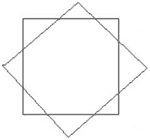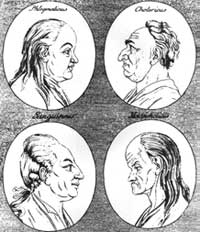Greece and the Humoral Tradition in Western Medicine
Beginning in the 6th century BCE, Greek philosophers began to seek natural explanations for "life, the universe, and everything." Like their counterparts in China and India (and some cross-influence is likely, especially between Greece and India), they came to see the body as an extension of the universe, subject to the same natural laws. In the Greek view, the body was composed of four humors—blood, phlegm, yellow bile (choler), and black bile—and, once again, disorders of the body resulted from imbalance among humors.
|
(Fire) Yellow Bile (Liver) |
||||
| Hot |
|
Dry | ||
|
(Air) Blood (Heart) |
(Earth) Black Bile (Spleen) |
|||
| Wet |
Cold |
|||
|
(Water) Phlegm (Brain) |
||||
|
Image courtesy of Greek physicians believed that the body was composed of four humors; illness occurred when the humors were out of balance. The great physician Hippocrates added further detail to this theory. |
||||
|
The four humors were often used to describe the personalities of people, as illustrated here. |
Hippocrates, the great Greek physician from the 5th century BCE, was the first to detail this understanding of the human body and disease. The 2d century CE Greek physician Galen elaborated further the nature of this relationship. He classified the temperaments according to the predominance of the particular humors. To this day the categories sanguine (sturdy, cheerful, and confident), phlegmatic (slow and stolid), choleric (hot-tempered), and melancholic are still in common descriptive usage. Attribution of health and illness to the four humors remained basic to European medicine at least until the 17th century.
Now we know how traditional medicine views the relationship between diseases and the human body.
This content has been re-published with permission from SEED. Copyright © 2025 Schlumberger Excellence in Education Development (SEED), Inc.


